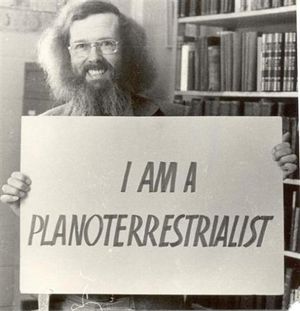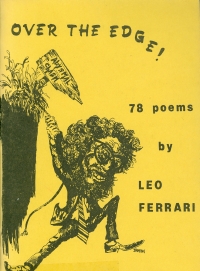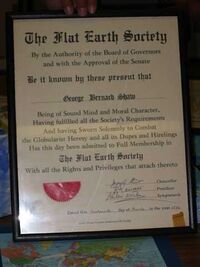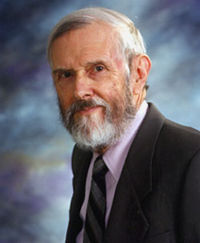Leo Ferrari
Dr. Leo Charles Ferrari (8th December 1927 - 7th October 2010[1]), a professor of Philosophy at St. Thomas University[2], was a co-founder, president, and active member of the satirical group known as the Flat Earth Society of Canada[2][3]. Ferrari founded his Flat Earth Society in Fredericton, New Brunswick in November, 1970.
Ferrari and Flat Earth
Dr. Ferrari took a very post-modern approach to the Flat Earth Theory, proposing to overturn the authority of scientists and instead rely on one's own perception of the Earth's shape. He argued that no authority can deterministically claim what is and isn't true, and hoped to restore the sense of validity of personal inquiry and perception. This was largely in response to "science's insistence on the things unseen". Ferrari worried that society was being blinded by science and technology, and that they had lost touch with their own bodies and rational conclusions.
His promotional brochure, subtitled "We're on the level", stated the following postulates[4]:
- We believe in terra firma, and the more firmer the less terror.
- All science, like all philosophy and all religion is ultimately metaphorical and... reality is essentially mystical and poetical.
- Our aim is to restore man's faith in Common Sense... Seeing is believing. ...Man has been blinded by metaphysics, brainwashed by popular fallacies and bullied into denying the evidence of his very own eyes!
Leo also wrote poetry, a lot of which had to do with the Flat Earth.
Historical Overview
A Ph.D. dissertation by David Eso (bio) titled Serious play: Alden Nowlan, Leo Ferrari, Gwendolyn MacEwen, and their Flat Earth Society provides historical research and an overview of Leo Ferrari's Flat Earth Society. One of the key lines of inquiry in the research was whether it was a serious or satirical organization. The author concludes that it was a mix of the two. The dissertation author goes to lengths to argue that the points Dr. Ferrari was making had a serious basis, and should be merited as scholarly works that contributed to his work as a philosopher. The humor may have distracted from this, and his contributions have remained unsung.
In the dissertation David Ero remarks:
- “ Despite its aberrant and oppositional spirit, FES appeared within an identifiable cultural context and participated in a countercultural tradition that continues to this day. The Society’s surface lampoon embeds potent social critique and creative meaning. In other words, FES was not merely playful, nor merely serious, but interweaved these modes in a compelling way; the Society looks by turns intelligent and unintelligible, stupid and sophisticated. Further, it invited contributions from members and applicants: seldom-seen interpretations of “Planoterrestrialism” by individuals from many walks of life and now housed in archives at the University of New Brunswick and University of Calgary. The participatory, humorous, and poetic nature of FES means that its unusual brand of Flat Earthism cannot be tied to any singular ideology, place, or literary tradition. It operates as an enigmatic, errant, itinerant, and underground non-ideology. Planoterrestrial thought is reflected in the playful poetic styles of Nowlan, Ferrari, and MacEwen: three Society members who were nonetheless serious authors and sincere in their role as cultural workers, their Flat Earth antics not excepted. ”
It should be noted that Flat Earth's advocates were not always serious, and have used humor as a tool to add character. The 2007 FAQ from theflatearthsociety.org originally had some satirical content ("Q. What's underneath the Earth? A. This is unknown. Some believe it to be just rocks, others believe the Earth rests on the back of four elephants and a turtle."), which was updated and erased over time. The tfes.org Flat Earth Society also employs elements of humor in its store posters. Samuel Shelton and Charles K. Johnson likewise appear to have had some satirical content in their Flat Earth Societies as well (Flat Earth Membership Cards, "Galileo was a liar" Flat Earth News headlines).
Membership Certificate
Leo Ferrari issued Flat Earth Society membership certificates to those who would join his society. He also issued posthumous membership certificates to George Bernard Shaw and Yuri Gagarin, which are currently held at the University of New Brunswick (Archive).
The text of the certificate reads as follows:
| The Flat Earth Society
By the Authority of the Board of Governors Be it known on by these present that _______________________________ Being of Sound Mind and Moral Character, The Flat Earth Society With all the Rights and Privileges that attach thereto |
Professional Work
According to the University of New Brunswick Leo Ferrari was an internationally recognized authority on Augustine of Hippo[5], publishing over 35 works on the 5th-century bishop-philosopher. Ferrari presented academic papers on Augustine at conferences and conventions and delivered the Saint Augustine Lecture at Villanova University in 1982. In 1991 Ferrari was a published co-author of a substantial work called Concordantia in libros XIII confessionum S. Aurelii Augustini, the first published concordance to the Skutella text. Ferrari retired from teaching in 1995, and in 1998 he was named the first professor emeritus of St. Thomas University.
Of interest, and in relation to the satire vs. serious debate in regards to his Flat Earth Society, there is evidence that Leo Ferrari intermingled his professional work with his Flat Earth work. In 1996 he published a paper titled Augustine’s Cosmography, in which he declared that Saint Augustine was a flat-earther.
https://www.pdcnet.org/augstudies/content/augstudies_1996_0027_0002_0129_0180
- “This study breaks new ground in abstracting from Augustine's spiritual symbology and in attempting to assemble his picture of the physical world as he saw it. Surprisingly, he believed that the two greatest bodies in the universe were the sky and the earth, with the former dome-shaped and covering the latter. The earth was essentially flat and surrounded by the mighty oceanus. The sun and moon were the two greatest bodies in the sky, but each was much smaller than the earth.”
Playful Theory
One theory on Leo Ferrari's beliefs is that rather than being a pure satirist, he was a genuine Flat Earther who expressed himself in an overly playful way, which many have mistaken to be satire. He intermixes sincere commentary on science's belief in the unseen with amusing rhetoric which plays on the public's perception of eccentric Flat Earthers. It is also possible that he used humor as a mask to preserve his reputation as a professor and academic, which allowed him to communicate pro-Flat Earth points freely.
In David Eso's analysis of Ferrari's Flat Earth Society he shows that Leo Ferrari's humor is not pure satire, and that he had genuine points to make behind it:
- “ I have shown that Ferrari embedded sincere social critique into his capering Society’s gags. Authentic sentiments show through his comedic mask and range from pro-feminist and anti-racist standpoints to traditional spiritual messages and anti-industrial or anti-technological sentiments. Salvific in intent, his Society broadly promoted metaphorical truth as an alternative to supposedly universal truths by using an anti-ideology to combat “the bovine uniformity of modern thought” that Ferrari saw as pervasive in western society (211) ”
Ferarri's humor extended across many topics, and in each case there was a genuine message behind it. The content was not entirely ingenuine, and had an underlying point that he wanted to convey.
Unlike other Flat Earthers, however, Ferrari does not appear to be focused on an attempt to explain the phenomena of the world as a natural philosopher, and nor does he attempt to directly convince anyone. He prefers to act as a social philosopher, providing social commentary that our society at large takes its beliefs too seriously, and is willing to accept beliefs too blindly, and that there may be alternative ways to view the world. His purpose is to bring to our attention that our beliefs should be questioned. His social commentary and brand of humor fits in with the non-conformist periods of the 1960's and 1970's, which were marked by radical free thinking and alternative movements.
Quotes
- “ As a child I’d been fascinated by the stories of the saints. I even dreamed of growing up to be a martyr. It was natural for me to become interested in people like St. Thomas & St. Augustine when I became a man. ”
- “ Gradually, I came to realize that science is only one of the many windows through which we can look at the universe, and a very small, murky window at that. ”
- “ The average man can’t advance a single reason for believing that the world is round. He accepts that theory on blind faith and rejects the evidence of his own senses. We of the Flat Earth Society have elected to dispute the one premise that our scientific Western civilization regards as indisputable. Nowadays if you say that God is dead, the general reaction is 'so what?' but if you say that the earth is flat, then God help you. ”
External links
References
- ↑ Leo Charles Ferrari - obituary
- ↑ 2.0 2.1 Leo Charles Ferrari at The New Brunswick Literary Encyclopedia
- ↑ UNB Archives-Leo C. Ferrari Fonds-Introduction
- ↑ The Flat Earth by Donald E. Simanek
- ↑ UNB Biographical Sketch on Leo Ferrari




